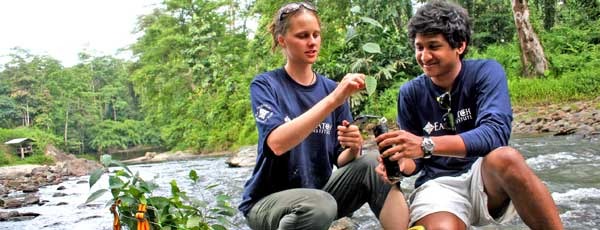Climate And Landscape Change In Borneo’s Rainforest
- Sabah, Malaysia
- Volunteer Vacations

| from $1,995* per person | 10 Days | July-October |
| Comfort accommodations | Exertion level: 3 | |
| Operator: Earthwatch Institute | 24 people max | |
With the help of Earthwatch volunteers, Dr. Glen Reynolds and his team aim to better understand biodiversity and ecosystem functioning in these forests and measure the impacts of climate change through rainfall and soil moisture analysis.
It is vital that well researched forest restoration programs are implemented to ensure the long-term survival of these unique rainforests. Dr. Reynolds hopes that this research will provide the science to underpin highly effective restoration.
Loading map, please wait...
Locations visited/nearby
Malaysia
0 testimonials about this trip.
1 testimonial about the provider, Earthwatch Institute:
-
Reviewer: L. Reifschneider
located in
St. Louis,
MO
USA
Elephant conservation is what drives my travel destinations. However, I always come home counting the blessings of new friends and an understanding of a culture and way of life I possibly would otherwise have never been introduced to. Through the Earthwatch projects I participate in, I am learning just how big and wonderful this world is.
Itinerary
On the ExpeditionHelp scientists carry out vital research to assess the impact of land use and climate change in Borneo's tropical rainforests to inform future conservation and restoration programs.
The rainforests of Borneo are some of the most diverse ecosystems in the world. They are home to thousands of plant species, countless types of insect, a vast array of birds and some of the world's most iconic and endangered mammals – the Sumatran rhino, clouded leopards and pygmy elephants. The rainforests are critically important in supporting this biodiversity - and to provide the critical ecosystem services of carbon sequestration, watershed protection, decomposition and nutrient cycling and soil stabilization. But they are under constant threat from unsustainable logging practices, conversion to agricultural land uses and climate change. The restoration of Borneo's remaining rainforest is essential - but the science guiding and underpinning the practice of rainforest restoration is woefully incomplete.
The project aims to understand how logging and land use change have impacted forests - and how 'resilient' these rainforests might be to the likely effects of climate change, particularly severe droughts. As a volunteer, you will trek deep into the heart of the tropical rainforest and, with a team of scientists and research assistants, assess the structure of the rainforest, how key the key plant and animal groups it supports have been impacted by logging and fragmentation, and how this disturbance has affected soil moisture, decomposition and soil erosion.
This information is critical if we are to find ways to conserve Borneo's remaining forests – and provide a strong scientific foundation for their restoration.
Meals and Accommodations
In the field, you'll spend a day at the Danum Valley Field Centre, the majority of the time however you will be staying at Malua Base Camp. Accommodation in both field locations is basic, yet comfortable, consisting of male and female dormitory-style rooms. At both locations, there are conventional showers and western toilets as well as electric fans and a washing machine. Food will be simple Malaysian style home cooking: steamed rice, vegetables, chicken and/or fish dishes
About the Research Area
Borneo is the third largest island in the world and much of it is covered with tropical rainforest. The island's rainforests have exceptionally rich biodiversity and are home to populations of orang-utan, pygmy elephants and rhino, all threatened by the loss of forests. The specific areas you will work in are among the most important and best protected lowland rainforests in South East Asia.
Malua Field Centre, where volunteers will be based, is a part of the one million hectare site, which belongs to the Sabah Foundation and is classified as a secondary lowland mixed dipterocarp production forest. Malua is located approximately 65 km north of Danum Valley. The site has been set up within the large-scale forest rehabilitation area also known as Sabah Biodiversity Experiment, which covers an area of 500 hectares of logged forest in the Malua Forest Reserve. The Sabah Biodiversity Experiment aims to study the importance of tree species diversity, composition and life history traits for providing fundamental ecosystem services such as carbon sequestration.
More information from Earthwatch Institute:
- View trip on provider's website
earthwatch.org/expeditions/climate-and-landscape-change-in-bo… - Company profile, experience, and history
- View all of their trips
- Email this trip page to a friend
-




Comments from Facebook